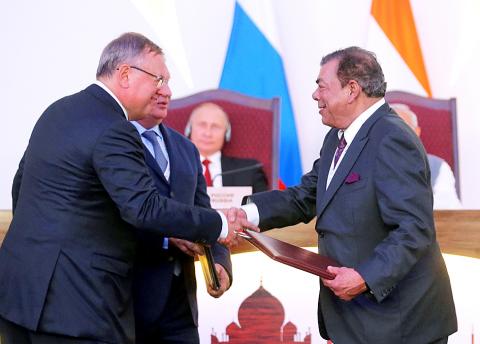India’s billionaire Ruia brothers agreed to sell a 98 percent stake in their refinery unit to Rosneft PJSC, Russia’s biggest listed oil producer, and a consortium of Trafigura and United Capital Partners for about US$13 billion.
Essar Group is to sell 49 percent of Essar Oil Ltd each to Rosneft and the consortium for an enterprise value of 728 billion rupees (US$10.91 billion), the Indian conglomerate said in a statement on Saturday. The equity valuation is to be about US$5.8 billion, the price at which the company was delisted, Essar Group director Prashant Ruia told reporters at a briefing in Goa, India.
The all-cash deal is to help Essar, which also runs steel mills and ports, cut debt by more than 50 percent, Ruia said.

Photo: Reuters
The transaction includes India’s second-largest refinery at Vadinar, and another US$2 billion is to be paid for a port terminal and power plant that helps feed the refinery, as well as about 2,700 pumps.
All approvals are expected by the end of this year and most of the proceeds are to go to retire debt, Ruia said.
It will be the single largest foreign direct investment in India.
The deal “proves the attractiveness of the Indian energy market to foreign investors,” said Chanda Kochhar, chief executive of ICICI Bank Ltd, which was helping Essar reduce debt. “This deal is also a significant step in the process of deleveraging the balance sheets of Indian corporates.”
The deal shows how oil-rich nations are investing overseas into refineries to secure an outlet for their production amid an intense battle for market share between OPEC and non-OPEC countries. On top of Russia, Saudi Arabia is buying stakes in refiners through its state-owned oil giant Saudi Aramco in countries from Indonesia to the US. Kuwait is also investing in oil processing facilities.
Essar Energy Holdings Ltd and Oil Bidco (Mauritius) Ltd — which control Essar Oil — have signed separate agreements for the 98 percent stake sale. The first outlines the sale of 49 percent to Petrol Complex Pte, a unit of Rosneft.
The second sees the remaining 49 percent sold to Kesani Enterprises Co — owned by a consortium led by Trafigura and United Capital Partners Russia’s VTB Bank PJSC is to lend Essar US$3.9 billion to restructure debt, Andrey Kostin, VTB chief executive, told reporters at a separate briefing in Goa.
Rosneft is to pay US$3.5 billion for the Essar deal, Kostin said.
Russia has been deepening energy ties with India, which is expected to surpass Japan as the world’s third-largest oil user this year to become the fastest-growing crude consumer through 2040, according to International Energy Agency estimates.
India’s state-owned energy companies are investing US$5.5 billion to buy stakes in Rosneft’s Vankor and Taas-Yuryakh fields.
The transaction — which Essar said is the biggest tranche of foreign direct investment in India — was announced on the sidelines of the Brazil, Russia, India, China and South Africa summit, attended by Indian Prime Minister Narendra Modi and Russian President Vladimir Putin.
It has the support of both their governments, Ruia said, adding that that he does not see sanctions on Russia affecting the deal.

RECYCLE: Taiwan would aid manufacturers in refining rare earths from discarded appliances, which would fit the nation’s circular economy goals, minister Kung said Taiwan would work with the US and Japan on a proposed cooperation initiative in response to Beijing’s newly announced rare earth export curbs, Minister of Economic Affairs Kung Ming-hsin (龔明鑫) said yesterday. China last week announced new restrictions requiring companies to obtain export licenses if their products contain more than 0.1 percent of Chinese-origin rare earths by value. US Secretary of the Treasury Scott Bessent on Wednesday responded by saying that Beijing was “unreliable” in its rare earths exports, adding that the US would “neither be commanded, nor controlled” by China, several media outlets reported. Japanese Minister of Finance Katsunobu Kato yesterday also

Taiwan’s rapidly aging population is fueling a sharp increase in homes occupied solely by elderly people, a trend that is reshaping the nation’s housing market and social fabric, real-estate brokers said yesterday. About 850,000 residences were occupied by elderly people in the first quarter, including 655,000 that housed only one resident, the Ministry of the Interior said. The figures have nearly doubled from a decade earlier, Great Home Realty Co (大家房屋) said, as people aged 65 and older now make up 20.8 percent of the population. “The so-called silver tsunami represents more than just a demographic shift — it could fundamentally redefine the

China Airlines Ltd (CAL, 中華航空) said it expects peak season effects in the fourth quarter to continue to boost demand for passenger flights and cargo services, after reporting its second-highest-ever September sales on Monday. The carrier said it posted NT$15.88 billion (US$517 million) in consolidated sales last month, trailing only September last year’s NT$16.01 billion. Last month, CAL generated NT$8.77 billion from its passenger flights and NT$5.37 billion from cargo services, it said. In the first nine months of this year, the carrier posted NT$154.93 billion in cumulative sales, up 2.62 percent from a year earlier, marking the second-highest level for the January-September

‘DRAMATIC AND POSITIVE’: AI growth would be better than it previously forecast and would stay robust even if the Chinese market became inaccessible for customers, it said Taiwan Semiconductor Manufacturing Co (TSMC, 台積電) yesterday raised its full-year revenue growth outlook after posting record profit for last quarter, despite growing market concern about an artificial intelligence (AI) bubble. The company said it expects revenue to expand about 35 percent year-on-year, driven mainly by faster-than-expected demand for leading-edge chips for AI applications. The world’s biggest contract chipmaker in July projected that revenue this year would expand about 30 percent in US dollar terms. The company also slightly hiked its capital expenditure for this year to US$40 billion to US$42 billion, compared with US$38 billion to US$42 billion it set previously. “AI demand actually